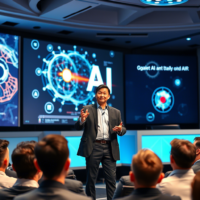Artificial intelligence (AI) has emerged as one of the most transformative technologies of our time, reshaping industries, businesses, and even everyday life. At the forefront of this revolution is NVIDIA, a company that has become synonymous with cutting-edge AI hardware and software solutions. In recent remarks, NVIDIA’s visionary CEO, Jensen Huang, emphasized that organizations worldwide are “racing” to adopt AI technology. This blog delves into his insights, exploring why AI adoption is accelerating, its implications for businesses, and how NVIDIA is leading the charge in this new era.
The Rise of AI: A Global Phenomenon
In today’s digital age, AI is no longer just a buzzword—it’s a reality that’s driving innovation across sectors. From healthcare and finance to retail and entertainment, companies are leveraging AI to enhance efficiency, improve decision-making, and create personalized customer experiences. According to Jensen Huang, the demand for AI capabilities has reached unprecedented levels, with organizations large and small striving to integrate these technologies into their operations.
Huang’s statement reflects the growing urgency among businesses to stay competitive in an increasingly data-driven world. As he puts it, “Everyone is racing to adopt AI because they understand that if they don’t, they risk being left behind.” This sentiment underscores the importance of embracing AI not as an optional tool but as a necessity for long-term success.
Why Are Businesses Racing Toward AI?
To comprehend the fervor surrounding AI adoption, we must first examine the benefits it offers:
1. Enhanced Efficiency
AI automates repetitive tasks, freeing up human resources to focus on more strategic initiatives. For example, manufacturing plants use AI-powered robots to streamline production processes, while call centers employ chatbots to handle routine inquiries.
2. Data-Driven Insights
With vast amounts of data being generated daily, AI enables businesses to extract valuable insights that would otherwise remain hidden. Machine learning algorithms can analyze consumer behavior patterns, predict market trends, and optimize supply chains.
3. Personalization
Consumers expect tailored experiences from brands, and AI makes this possible by analyzing individual preferences and habits. Recommendation engines used by streaming platforms like Netflix and e-commerce giants like Amazon are prime examples of AI-driven personalization.
4. Cost Savings
By reducing errors, minimizing waste, and improving resource allocation, AI helps organizations cut costs significantly. For instance, predictive maintenance powered by AI reduces downtime for industrial equipment, saving millions in repair expenses.
5. Competitive Advantage
Companies that harness AI effectively gain a significant edge over competitors who lag behind. Early adopters often enjoy higher profitability, better customer satisfaction, and greater market share.
Jensen Huang’s Vision for AI Leadership
As the leader of NVIDIA, Jensen Huang plays a pivotal role in shaping the future of AI. Under his guidance, NVIDIA has positioned itself as a pioneer in developing advanced AI technologies, including GPUs (graphics processing units), deep learning frameworks, and specialized software tools.
Huang believes that AI will redefine every industry, much like electricity transformed the world during the Industrial Revolution. He envisions a future where AI becomes an integral part of all computing systems, enabling breakthroughs in areas such as autonomous vehicles, climate modeling, drug discovery, and beyond.
One of NVIDIA’s key contributions to this vision is its CUDA platform, which allows developers to build powerful AI applications using GPU acceleration. Additionally, the company’s DGX series of servers provides enterprises with scalable infrastructure to train complex AI models quickly and efficiently.
How NVIDIA Is Driving AI Adoption
NVIDIA’s commitment to advancing AI extends far beyond product development. The company actively supports research communities, collaborates with academia, and partners with businesses to democratize access to AI technology. Some notable initiatives include:
1. AI Research Grants
Through programs like the NVIDIA AI Grant, researchers receive funding and resources to explore novel applications of AI. These efforts have led to groundbreaking discoveries in fields ranging from genomics to robotics.
2. Educational Programs
NVIDIA offers training courses and certifications through its Deep Learning Institute (DLI), equipping professionals with the skills needed to implement AI solutions. By investing in education, NVIDIA ensures that there is a steady pipeline of talent ready to drive innovation.
3. Industry Collaborations
From working with automakers to develop self-driving cars to partnering with hospitals to improve diagnostic accuracy, NVIDIA engages with diverse industries to tailor AI solutions to specific needs. Such collaborations demonstrate the versatility and adaptability of AI technology.
Challenges and Ethical Considerations
While the race to adopt AI presents immense opportunities, it also raises important challenges and ethical concerns. Organizations must navigate issues such as:
1. Bias in Algorithms
AI systems trained on biased datasets can perpetuate unfairness and discrimination. Ensuring fairness and transparency in AI development is crucial to building trust with users.
2. Security Risks
As AI becomes more integrated into critical systems, it becomes a target for cyberattacks. Companies must prioritize robust security measures to protect sensitive information.
3. Job Displacement
Automation driven by AI may lead to job losses in certain sectors. Addressing this issue requires proactive strategies, such as reskilling workers and creating new employment opportunities in emerging fields.
4. Regulatory Compliance
Governments worldwide are beginning to introduce regulations governing AI usage. Staying compliant with evolving laws will be essential for businesses operating in this space.
Conclusion: Embracing the AI Revolution
Jensen Huang’s assertion that everyone is “racing” to adopt AI highlights the undeniable momentum behind this technological shift. Whether you’re a tech giant or a small startup, ignoring AI could mean missing out on transformative growth opportunities. However, successful AI integration demands careful planning, ethical considerations, and collaboration with experts.
NVIDIA continues to lead the charge in making AI accessible and impactful, empowering businesses to unlock its full potential. As Huang aptly notes, “AI is not just about technology; it’s about solving real-world problems.” By embracing AI responsibly and strategically, organizations can thrive in this exciting new era of innovation.

